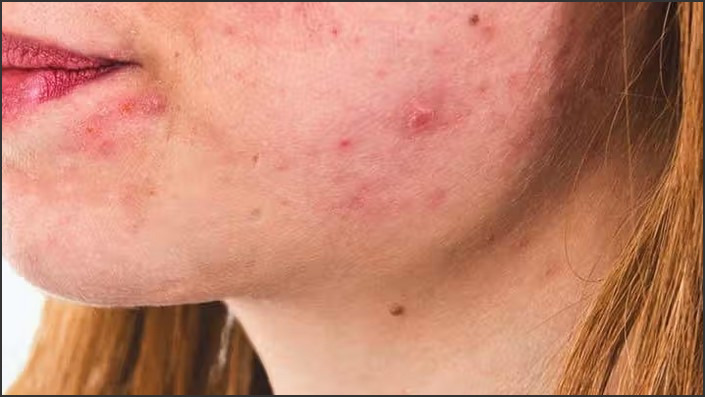Category Archives: Health
Isotretinoin Capsules: Understanding the Medication for Severe Acne

Source : https://media.post.rvohealth.io
Isotretinoin capsules are a potent medication primarily used for the treatment of severe acne that has not responded to other treatments. This oral drug, often known by its brand name Accutane, belongs to a class of medications called retinoids, derived from Vitamin A. It works by reducing the amount of oil secreted by oil glands in the skin, helping the skin renew itself more quickly. While highly effective, Isotretinoin is typically used as a last resort due to its potential for serious side effects, including birth defects. Therefore, understanding this medication, its usage, benefits, and risks is crucial for patients dealing with severe acne.
Unveiling the Power of Isotretinoin Capsules in Treating Severe Acne
Isotretinoin capsules, commonly known by the brand name Accutane, have been a game-changer in the treatment of severe acne. This powerful medication, derived from vitamin A, has been used for decades to treat the most stubborn cases of acne that do not respond to other treatments. Understanding the mechanism of action, benefits, and potential side effects of isotretinoin can help individuals make informed decisions about their acne treatment.
Isotretinoin works by reducing the size and output of the sebaceous glands in the skin, which produce oil. Overproduction of oil is a key factor in the development of acne. By reducing oil production, isotretinoin helps to prevent the formation of acne lesions. Additionally, isotretinoin has anti-inflammatory properties, which can help to reduce the redness and swelling associated with acne.
The benefits of isotretinoin in treating severe acne are significant. Many individuals who take isotretinoin experience a dramatic reduction in the number and severity of their acne lesions. In many cases, isotretinoin can clear acne completely. This can have a profound impact on an individual’s self-esteem and quality of life. Moreover, isotretinoin can help to prevent the scarring that often accompanies severe acne.
However, isotretinoin is not without potential side effects. The most common side effects include dry skin, lips, and eyes, as well as joint and muscle pain. More serious side effects can include changes in mood or behavior, and in rare cases, isotretinoin has been linked to inflammatory bowel disease and increased pressure in the brain. Due to the potential for serious side effects, isotretinoin is typically reserved for severe cases of acne that have not responded to other treatments.
Furthermore, isotretinoin is known to cause birth defects if taken during pregnancy. Therefore, it is crucial that women of childbearing age use effective contraception while taking isotretinoin and for one month after stopping the medication. Regular pregnancy tests are also required before, during, and after treatment with isotretinoin.
Despite these potential side effects, isotretinoin remains a highly effective treatment for severe acne. The decision to use isotretinoin should be made in consultation with a dermatologist, who can assess the severity of the acne, discuss the potential benefits and risks, and monitor the individual for side effects during treatment.
In conclusion, isotretinoin capsules have revolutionized the treatment of severe acne. By reducing oil production and inflammation, isotretinoin can clear acne and prevent scarring, significantly improving an individual’s quality of life. However, due to the potential for serious side effects, isotretinoin should be used under the careful supervision of a dermatologist. With a thorough understanding of the medication, individuals can make informed decisions about their acne treatment and achieve clearer, healthier skin.Isotretinoin capsules are a highly effective medication for severe acne that is not responsive to other treatments. They work by reducing the production of the skin’s natural oil (sebum) that can lead to severe acne. However, they also come with significant potential side effects, including birth defects if taken during pregnancy, and therefore must be used under strict medical supervision. Despite these risks, for many patients with severe acne, isotretinoin can provide significant relief and improvement in their condition.
Seed Wart on Finger: Removal Techniques and Home Remedies

Source : https://content.api.news
Seed wart on the finger is a common skin condition caused by the human papillomavirus (HPV). These warts are characterized by their hard, grainy appearance and can be uncomfortable or even painful. This article will explore various techniques for removing seed warts, including medical procedures and home remedies. It will provide a comprehensive guide on how to deal with this skin condition, from identifying the wart to the steps of effective removal and prevention.
Seed Wart on Finger: Removal Techniques and Home Remedies
Seed warts, medically known as verruca, are small, rough growths caused by the human papillomavirus (HPV). They often appear on fingers and hands, but can also occur on other parts of the body. Although they are generally harmless, they can be unsightly and sometimes painful. Fortunately, there are several removal techniques and home remedies available to treat seed warts on fingers.
One of the most common methods for removing seed warts is cryotherapy, a procedure that involves freezing the wart with liquid nitrogen. This treatment is typically performed by a healthcare professional in a clinical setting. The liquid nitrogen causes the wart to blister and eventually fall off, usually within a week or two. While cryotherapy is generally safe and effective, it can cause mild discomfort and may require multiple treatments to completely remove the wart.
Another common treatment for seed warts is salicylic acid, which is available over-the-counter in various forms such as patches, gels, and ointments. Salicylic acid works by gradually peeling off the wart layer by layer. It is important to follow the instructions on the product label and to protect the surrounding skin, as salicylic acid can cause irritation if applied to healthy skin. This treatment typically takes several weeks to months to completely remove the wart.
In addition to these treatments, there are several home remedies that may help to treat seed warts. One popular home remedy is the use of duct tape. This involves covering the wart with a small piece of duct tape for about six days, then soaking the wart in water and gently removing the dead skin with a pumice stone or emery board. This process is repeated until the wart is gone. While some people have found this method to be effective, scientific evidence supporting its effectiveness is limited.
Another home remedy involves the use of apple cider vinegar. This involves soaking a cotton ball in apple cider vinegar and applying it to the wart, then covering it with a bandage overnight. The acid in the vinegar is believed to help break down the wart. However, like the duct tape method, scientific evidence supporting the effectiveness of this remedy is limited.
It is important to note that while these treatments and home remedies can be effective, they may not work for everyone. Additionally, they may not be suitable for people with certain health conditions or for warts on sensitive areas of the body. Therefore, it is always recommended to consult with a healthcare professional before starting any new treatment for seed warts.
In conclusion, seed warts on fingers can be effectively treated with various removal techniques and home remedies. Cryotherapy and salicylic acid are common treatments that are generally safe and effective. Home remedies such as duct tape and apple cider vinegar may also be helpful, although scientific evidence supporting their effectiveness is limited. Regardless of the treatment chosen, it is important to consult with a healthcare professional to ensure that the treatment is suitable and safe.Seed warts on fingers can be effectively managed through various removal techniques and home remedies. Removal techniques include cryotherapy, surgical removal, laser therapy, and over-the-counter treatments containing salicylic acid. Home remedies involve the use of apple cider vinegar, garlic, duct tape, and banana peels. However, it’s important to consult a healthcare professional before starting any treatment to avoid complications. Despite these methods, seed warts can recur, and prevention through good hygiene practices is crucial.
Early Stages of COPD: Recognizing Symptoms and Seeking Care

Source : https://www.health.com
Early Stages of COPD: Recognizing Symptoms and Seeking Care is an informative guide that focuses on the initial stages of Chronic Obstructive Pulmonary Disease (COPD), a progressive lung disease that makes it hard to breathe. The guide aims to educate readers about the early signs and symptoms of COPD, which often go unnoticed or are mistaken for a less serious condition like a common cold. It emphasizes the importance of early detection and immediate medical attention to slow the disease’s progression and maintain a good quality of life. The guide also provides insights into the necessary care and management strategies for individuals diagnosed with COPD.
Understanding the Early Stages of COPD: Recognizing Symptoms and Seeking Immediate Care
Chronic Obstructive Pulmonary Disease (COPD) is a progressive lung disease that obstructs airflow and makes it increasingly difficult for individuals to breathe. It is a significant cause of morbidity and mortality worldwide, and early detection is crucial in managing the disease effectively. Understanding the early stages of COPD, recognizing the symptoms, and seeking immediate care can significantly improve the quality of life for those affected.
COPD is often undiagnosed in its early stages, primarily because many people dismiss the initial symptoms as a normal part of aging or a side effect of being a smoker. However, these early signs should not be overlooked. The most common symptoms include a persistent cough, often referred to as a ‘smoker’s cough,’ shortness of breath, especially during physical activities, wheezing, chest tightness, and frequent respiratory infections. As the disease progresses, symptoms may become more severe and debilitating, leading to a significant decrease in the quality of life.
One of the most critical aspects of managing COPD is early detection. The sooner the disease is diagnosed, the more effective the treatment can be. Therefore, if you or a loved one are experiencing any of these symptoms, it is essential to seek medical attention immediately. A healthcare provider can conduct various tests, such as spirometry, to measure lung function and confirm a COPD diagnosis.
Once diagnosed, the next step is to develop a comprehensive care plan. This typically involves lifestyle changes, medication, and in some cases, pulmonary rehabilitation. Lifestyle changes may include quitting smoking, avoiding exposure to lung irritants, and maintaining a healthy diet and regular exercise routine. Medications used to treat COPD can help to reduce symptoms, prevent complications, and improve overall lung function. Pulmonary rehabilitation is a program that helps people with lung diseases improve their quality of life through exercise, education, and support.
It’s important to note that while COPD is a chronic and progressive disease, it is also manageable with the right care. Regular follow-ups with a healthcare provider are crucial to monitor the disease’s progression and adjust treatment as necessary. Additionally, individuals with COPD should receive annual flu vaccinations and regular pneumonia vaccinations to prevent respiratory infections, which can exacerbate COPD symptoms.
In conclusion, recognizing the early stages of COPD and seeking immediate care is vital in managing the disease effectively. By understanding the symptoms and the importance of early detection, individuals can take proactive steps towards maintaining their health and improving their quality of life. Despite the challenges that come with a COPD diagnosis, with the right care and support, individuals can continue to lead fulfilling lives.In conclusion, the early stages of COPD are often characterized by subtle symptoms such as shortness of breath, frequent coughing, and fatigue. These symptoms are often overlooked or mistaken for normal aging or lack of fitness. However, early recognition of these symptoms is crucial as it allows for early intervention and treatment, which can significantly slow the progression of the disease and improve quality of life. Therefore, individuals experiencing these symptoms should seek medical care promptly.
Alcohol Carcinogen: Exploring the Link Between Alcohol and Cancer

Source : https://d2jx2rerrg6sh3.cloudfront.net
Alcohol Carcinogen: Exploring the Link Between Alcohol and Cancer is an in-depth study into the correlation between alcohol consumption and the development of various types of cancer. This research aims to shed light on the carcinogenic properties of alcohol, examining how and why regular alcohol intake can lead to the mutation of healthy cells into cancerous ones. The study delves into the biological mechanisms involved, the types of cancer most commonly associated with alcohol, and the risk factors that may exacerbate this link. It also explores potential preventative measures and strategies for reducing alcohol-related cancer risks.
Unveiling the Truth: The Connection Between Alcohol and Cancer
Alcohol, a common beverage consumed worldwide, has been a part of human culture for thousands of years. However, in recent years, a growing body of scientific evidence has begun to shed light on the potential health risks associated with alcohol consumption, particularly its link to cancer. This article aims to explore the connection between alcohol and cancer, unveiling the truth behind this complex relationship.
Alcohol is classified as a Group 1 carcinogen by the International Agency for Research on Cancer (IARC), the cancer agency of the World Health Organization. This classification places alcohol in the same category as tobacco and asbestos, indicating that there is sufficient evidence to suggest that alcohol can cause cancer in humans. The types of cancer most commonly associated with alcohol consumption include mouth, throat, esophagus, liver, colon, and breast cancer.
The mechanism through which alcohol contributes to cancer development is multifaceted. When alcohol is consumed, it is metabolized in the body into a toxic chemical called acetaldehyde. Acetaldehyde can damage DNA and proteins, leading to cellular abnormalities and potentially triggering the onset of cancer. Additionally, alcohol can stimulate the body to produce certain hormones, such as estrogen, which is known to promote the growth of certain types of cancer, including breast cancer.
Moreover, alcohol can act as a solvent, enhancing the body’s absorption of other carcinogens. For instance, in the case of smokers who also consume alcohol, the alcohol can dissolve the harmful chemicals in tobacco smoke, making them more easily absorbed in the mouth and throat and thereby increasing the risk of developing oral and throat cancers.
It’s important to note that the risk of developing cancer increases with the amount of alcohol consumed. Even moderate drinking can elevate cancer risk, but heavy drinkers are at a significantly higher risk. According to the American Cancer Society, those who consume two to three drinks per day have about a 20% higher risk compared to non-drinkers.
However, it’s not all doom and gloom. The good news is that the risk of developing alcohol-related cancers decreases when alcohol consumption is reduced or eliminated. A study published in the British Medical Journal found that reducing alcohol intake, even for heavy drinkers, can lower cancer risk over time.
In conclusion, the link between alcohol and cancer is undeniable. Alcohol is a proven carcinogen that can contribute to the development of several types of cancer. The risk increases with the amount of alcohol consumed, but can be mitigated by reducing or eliminating alcohol intake. As with many aspects of health, moderation is key. It’s crucial for individuals to be aware of the potential risks associated with alcohol consumption and to make informed decisions about their drinking habits. While alcohol may be a part of our social fabric, understanding its potential health implications is essential in making choices that support long-term health and wellbeing.In conclusion, numerous studies have established a significant link between alcohol consumption and an increased risk of various types of cancer. Alcohol acts as a carcinogen, particularly in tissues it comes into direct contact with, such as the mouth, throat, and esophagus. It can also lead to liver, breast, and colorectal cancer. The risk increases with the amount of alcohol consumed over time. Therefore, limiting or avoiding alcohol intake can significantly reduce the risk of developing these types of cancers.
Home Remedies for Cold Sores on the Lip: Natural Relief Options

Source : https://www.newmouth.com
Home Remedies for Cold Sores on the Lip: Natural Relief Options is a comprehensive guide that provides an array of natural solutions to alleviate the discomfort caused by cold sores. This guide explores various home remedies, from herbal treatments to lifestyle changes, that can help manage and reduce the frequency of cold sore outbreaks. It aims to offer a holistic approach to dealing with this common health issue, emphasizing the use of natural ingredients and methods that can be easily incorporated into daily routines.
Effective Home Remedies for Cold Sores on the Lip: Exploring Natural Relief Options
Cold sores, also known as fever blisters, are small, painful blisters that typically form on the lips or around the mouth. They are caused by the herpes simplex virus type 1 (HSV-1), a highly contagious virus that can be easily transmitted from person to person through close personal contact. While there is no cure for the virus, there are several home remedies that can help alleviate the discomfort and speed up the healing process of cold sores on the lip.
One of the most effective home remedies for cold sores is the application of a cold compress. This simple yet effective method can help reduce inflammation and pain. Simply wrap a few ice cubes in a clean cloth and apply it to the affected area for about 10 minutes. Repeat this process several times a day until the cold sore subsides.
Another natural relief option is the use of essential oils. Tea tree oil, for instance, has antiviral properties that can help combat the HSV-1 virus. To use, dilute a few drops of tea tree oil with a carrier oil like coconut or olive oil and apply it to the cold sore using a cotton swab. Be sure to wash your hands thoroughly before and after application to prevent the spread of the virus.
Lemon balm is another herb known for its antiviral properties. A study published in the Journal of Dermatological Treatment found that topical creams containing lemon balm helped reduce redness and swelling in cold sores. To use, apply a lemon balm ointment to the affected area several times a day.
Diet also plays a crucial role in managing cold sores. Foods rich in lysine, an essential amino acid, can help prevent the outbreak of cold sores. Lysine inhibits the replication of the HSV-1 virus, thereby reducing the frequency of outbreaks. Foods high in lysine include fish, chicken, beef, lamb, milk, cheese, beans, brewer’s yeast, mung bean sprouts, and most fruits and vegetables.
Hydration is another key factor in managing cold sores. Drinking plenty of water can help keep your body hydrated, which in turn can help speed up the healing process. Avoiding caffeine and alcohol, which can dehydrate the body, is also recommended.
While these home remedies can provide relief, it’s important to remember that they are not a cure for the HSV-1 virus. The virus remains dormant in the body and can reactivate at any time, leading to recurrent outbreaks. Therefore, it’s crucial to maintain a healthy lifestyle, manage stress levels, and avoid triggers that can cause outbreaks, such as exposure to sunlight, fatigue, and illness.
In conclusion, while cold sores can be uncomfortable and unsightly, there are several home remedies that can provide natural relief. From the application of a cold compress to the use of essential oils and dietary changes, these remedies can help manage symptoms and speed up the healing process. However, it’s important to remember that these remedies are not a cure for the virus. Maintaining a healthy lifestyle and avoiding triggers is key to managing cold sores effectively.In conclusion, home remedies for cold sores on the lip, such as applying a cold compress, using a lip balm with SPF, taking lysine supplements, and using essential oils like tea tree oil, can provide natural relief options. These remedies can help to reduce the severity and duration of cold sores, alleviate pain and discomfort, and prevent future outbreaks. However, they are not a substitute for professional medical advice and treatment. It’s always recommended to consult with a healthcare provider for persistent or severe symptoms.





